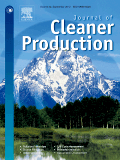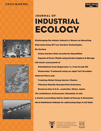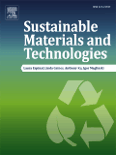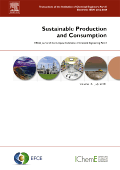
Recycling
Scope & Guideline
Driving impactful change in recycling and sustainability.
Introduction
Aims and Scopes
- Sustainable Waste Management Practices:
Focuses on innovative strategies for managing waste sustainably, emphasizing the importance of reducing waste generation and enhancing recycling rates. - Technological Innovations in Recycling:
Explores new technologies and methodologies for recycling materials, including waste-to-energy processes, advanced sorting techniques, and the application of artificial intelligence in recycling. - Circular Economy and Resource Recovery:
Examines the principles of circular economy, promoting resource recovery and reuse of materials to minimize waste and environmental impact. - Life Cycle Assessment (LCA) in Recycling:
Utilizes LCA methodologies to assess the environmental impacts of recycling processes, helping to inform decision-making and policy development. - Recycling of Specific Materials:
Investigates the recycling potential of various materials, including plastics, metals, electronic waste, and organic waste, focusing on the development of effective recycling processes.
Trending and Emerging
- Advanced Recycling Technologies:
There is a significant increase in research on advanced recycling technologies, such as pyrolysis, biochemical methods, and AI-driven sorting systems, indicating a shift towards more sustainable and efficient recycling solutions. - Circular Economy Models:
Emerging studies are increasingly focused on the implementation of circular economy models across various industries, highlighting the importance of resource recovery and sustainable production practices. - Biowaste and Organic Recycling:
Research on biowaste recycling, including the valorization of food waste and agricultural residues, is gaining momentum as part of broader sustainability efforts. - E-Waste Management Innovations:
A growing body of work is exploring innovative methods for recycling electronic waste, driven by the increasing volume of e-waste and the need for recovery of valuable materials. - Life Cycle Assessment in Recycling Practices:
The application of life cycle assessment (LCA) methodologies is trending, providing insights into the environmental impacts of recycling processes and supporting sustainable decision-making.
Declining or Waning
- Traditional Recycling Methods:
There is a noticeable decrease in publications focusing on conventional recycling methods, as newer, more efficient technologies gain traction. - General Waste Management Practices:
Research that broadly discusses waste management without a specific focus on recycling technologies or materials is becoming less frequent, suggesting a shift towards more targeted studies. - Basic Studies on Recycling Awareness:
While important, papers solely addressing public awareness of recycling practices have decreased, indicating a move towards more actionable and technology-driven research.
Similar Journals

Journal of Cleaner Production
Pioneering Research in Environmental SustainabilityThe Journal of Cleaner Production, published by Elsevier Science Ltd, is a leading interdisciplinary journal dedicated to the development and dissemination of knowledge on environmental sustainability and cleaner production practices. With an impact factor that reflects its high relevance in the field, the journal is recognized as a Q1 publication in key categories including Environmental Science, Industrial and Manufacturing Engineering, Renewable Energy, and Strategy and Management as of 2023. This prestigious journal has been a platform for groundbreaking research since its inception in 1993 and continues to shape the dialogue around sustainable practices in various sectors. Researchers and professionals across disciplines can access its wealth of insights, which are critical for driving the transition towards more sustainable production and consumption models. The journal’s rigorous peer-review process ensures that only high-quality research is published, making it an essential resource for academics, industry leaders, and policymakers committed to advancing cleaner production methodologies.

Resources Conservation & Recycling Advances
Advancing sustainability through innovative research.Welcome to Resources Conservation & Recycling Advances, an influential open-access journal published by Elsevier since its inception in 2021. With an ISSN of 2667-3789, this journal serves as a vital platform for disseminating cutting-edge research in the fields of economics, waste management, and environmental science. Recognized for its high impact, it proudly holds a Q1 ranking in both Economics and Econometrics as well as Waste Management and Disposal, highlighting its significance within these critical categories. The journal aims to advance understanding and innovation in resource conservation and recycling practices, making it an essential resource for researchers, professionals, and students dedicated to sustainability. With its current Scopus rankings placing it in the top percentiles—34th out of 716 in Economics and Econometrics and 21st out of 134 in Waste Management—Resources Conservation & Recycling Advances continues to contribute to meaningful discussions and developments in the pursuit of a more sustainable future.

WASTE MANAGEMENT & RESEARCH
Transforming waste challenges into research opportunities.WASTE MANAGEMENT & RESEARCH, published by SAGE PUBLICATIONS LTD, is a premier journal dedicated to advancing the field of waste management and environmental concern. Established in 1983, this esteemed publication spans a comprehensive range of topics within Environmental Engineering, Pollution, and Waste Management and Disposal, with remarkable standings including a Q1 ranking in Environmental Engineering and a Q2 ranking in both Pollution and Waste Management and Disposal as of 2023. With an impressive Scopus ranking, placing it in the top percentiles of its categories, the journal serves as a vital resource for researchers, professionals, and students seeking to explore innovative solutions to waste management challenges. Although not an open access journal, its rigorous peer-review process ensures high-quality and novel research is made available to the academic community. Located in London, UK, WASTE MANAGEMENT & RESEARCH continues to be influential in shaping policies and practices that impact sustainable waste management practices worldwide.

Detritus
Transforming challenges into opportunities for environmental progress.Detritus, an esteemed open-access journal published by CISA PUBLISHER since 2018, serves as a vital platform for the dissemination of innovative research in the fields of Environmental Chemistry, Environmental Engineering, and Waste Management and Disposal. Based in Padova, Italy, the journal aims to foster scholarly communication and collaboration among researchers, professionals, and students dedicated to advancing our understanding of environmental challenges and solutions. With its open-access model, Detritus ensures that high-quality research is freely available, bridging the information gap within the scientific community. While currently categorized in the Q3 quartile across multiple environmental science disciplines, the journal is poised to further enhance its visibility and impact, contributing significantly to pressing global issues such as waste reduction and sustainable resource management. As the journal continues to evolve, it encourages submissions that advance theory and application in these critical areas.

Journal of Mining Institute
Unlocking Insights in Mining and GeologyThe Journal of Mining Institute, published by SAINT-PETERSBURG MINING UNIVERSITY, stands as a premier platform for disseminating cutting-edge research in the fields of Economic Geology, Geology, and Geotechnical Engineering. With an impressive Q1 ranking in various quartiles for 2023, this journal offers enlightening insights into earth sciences, reflecting its substantial impact within the academic community. The journal, accessible in open access format since 1975, ensures that researchers, professionals, and students can readily access high-quality research articles. The ISSN for the print version is 2411-3336 and E-ISSN 2541-9404, supporting its reach both online and offline. As it converges knowledge from 2017 to 2024, the Journal of Mining Institute serves as an essential resource for understanding contemporary challenges and innovations in mining and geology, encouraging a collaborative exploration of sustainable practices and technological advancements in these critical fields.

Rocznik Ochrona Srodowiska
Empowering Researchers to Tackle Pressing Environmental IssuesRocznik Ochrona Srodowiska, published by the Middle Pomeranian Scientific Society for Environmental Protection, is an esteemed journal dedicated to advancing the field of environmental science in Poland and beyond. With an ISSN of 1506-218X, this peer-reviewed journal has established itself as a vital resource since its inception in 2007, addressing various environmental issues and promoting sustainable practices. Currently holding a Q3 category ranking in the Environmental Science (miscellaneous) field for 2023, it places itself in the 23rd percentile of Scopus rankings, reflecting a growing influence in the broader environmental research community. While the journal is not open access, it serves as an important conduit for researchers, professionals, and students to disseminate their findings and contribute to the interdisciplinary dialogue aimed at tackling pressing environmental challenges. With a commitment to rigorous research and practical applications, Rocznik Ochrona Srodowiska remains an essential platform for fostering innovation and collaboration in environmental studies.

JOURNAL OF INDUSTRIAL ECOLOGY
Pioneering Insights into Ecological Industrial PracticesJOURNAL OF INDUSTRIAL ECOLOGY, published by Wiley, is a leading academic journal that focuses on the intersection of industrial practices and ecological sustainability. With an ISSN of 1088-1980 and an E-ISSN of 1530-9290, this journal has established itself as a premier outlet for research in economic, environmental, and social sciences, evidenced by its Q1 rankings in key categories such as Economics and Econometrics, Environmental Science, and General Social Sciences as of 2023. Spanning over two decades from 1997 to 2024, it offers invaluable insights into innovative approaches for designing sustainable industrial systems, informing policy decisions, and advancing interdisciplinary collaborations. While the journal does not currently offer open access options, its high impact in the field—illustrated by its impressive Scopus rankings, where it ranks 5th among 275 in General Social Sciences and 23rd among 233 in General Environmental Science—reinforces its importance to researchers, professionals, and students dedicated to the principles of sustainable development and industrial ecology.

ENVIRONMENTAL ENGINEERING SCIENCE
Bridging science and practice for a healthier environment.ENVIRONMENTAL ENGINEERING SCIENCE is a leading journal published by MARY ANN LIEBERT, INC that provides a platform for pioneering research in the fields of environmental chemistry, pollution control, and waste management. With an ISSN of 1092-8758 and an E-ISSN of 1557-9018, this peer-reviewed journal aims to disseminate high-quality scientific studies that address critical environmental challenges. As evidenced by its 2023 category quartile rankings, it holds a notable position at Q3 in Environmental Chemistry and Pollution and Q2 in Waste Management and Disposal, highlighting its relevance and impact in these domains. Spanning over two decades from 1997 to 2024, the journal is dedicated to fostering innovations and promoting rigorous scholarship that can contribute significantly to sustainable environmental practices globally. Authors and researchers are encouraged to engage with this essential resource, which offers Open Access options to enhance the visibility and reach of their work. For those interested in advancing their understanding and practice within the environmental sciences, ENVIRONMENTAL ENGINEERING SCIENCE is an indispensable journal to consider.

Sustainable Materials and Technologies
Exploring Innovative Paths to Material SustainabilitySustainable Materials and Technologies is an esteemed journal published by Elsevier, focusing on pioneering research and innovative solutions in the fields of industrial engineering, materials science, and environmental sustainability. With a prestigious Q1 ranking in multiple relevant categories—including Industrial and Manufacturing Engineering, Materials Science, Renewable Energy, Sustainability, and Waste Management—this journal is positioned as a leading platform for disseminating high-impact research that addresses pressing challenges in material sustainability. Recognized for its rigorous peer-review process and commitment to academic excellence, Sustainable Materials and Technologies is dedicated to providing open access to groundbreaking studies and practical methodologies that drive forward the agenda for a sustainable future. Since its inception in 2014, the journal has been integral for professionals, researchers, and students who are engaged in the quest for innovative materials and technologies that minimize ecological footprints. Join a community at the forefront of sustainability science by contributing to and engaging with the transformative research published in this pivotal journal.

Sustainable Production and Consumption
Championing Environmental Stewardship through KnowledgeWelcome to Sustainable Production and Consumption, a premier journal published by Elsevier in the vibrant field of sustainability and environmental science. With an ISSN of 2352-5509, this journal has established itself as a leading platform for innovative research and discourse on sustainable manufacturing, consumption practices, and environmental technologies. As evidenced by its impressive 2023 rankings—Q1 in Environmental Chemistry, Environmental Engineering, Industrial and Manufacturing Engineering, and Renewable Energy, Sustainability and the Environment—the journal ranks among the top tier of its field. Researchers and professionals alike are invited to explore the journal’s rigorous peer-reviewed articles, which aim to advance the understanding and implementation of sustainable practices across various industries. With a strong commitment to disseminating impactful research, Sustainable Production and Consumption serves as an essential resource for academics, policy makers, and industry leaders seeking to address the challenges of modern environmental sustainability.